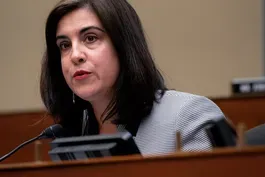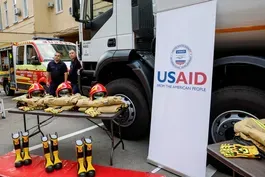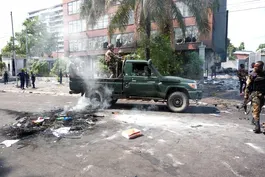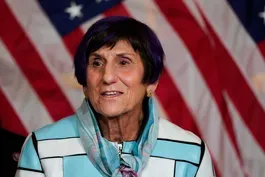
Pacific Palisades begins to face extent of wildfire recovery
Clip: 1/28/2025 | 4m 41sVideo has Closed Captions
Pacific Palisades residents begin to face extent of wildfire recovery
Recovery efforts continue in Southern California as the fires that ravaged the state have now largely gone out. William Brangham reports from the Los Angeles area where he has been speaking to people who are hoping to get back to their homes to see the damage.
Major corporate funding for the PBS News Hour is provided by BDO, BNSF, Consumer Cellular, American Cruise Lines, and Raymond James. Funding for the PBS NewsHour Weekend is provided by...

Pacific Palisades begins to face extent of wildfire recovery
Clip: 1/28/2025 | 4m 41sVideo has Closed Captions
Recovery efforts continue in Southern California as the fires that ravaged the state have now largely gone out. William Brangham reports from the Los Angeles area where he has been speaking to people who are hoping to get back to their homes to see the damage.
How to Watch PBS News Hour
PBS News Hour is available to stream on pbs.org and the free PBS App, available on iPhone, Apple TV, Android TV, Android smartphones, Amazon Fire TV, Amazon Fire Tablet, Roku, Samsung Smart TV, and Vizio.
Providing Support for PBS.org
Learn Moreabout PBS online sponsorshipAMNA NAWAZ: Recovery efforts are under way in Southern California, as the fires that ravaged the state have now largely gone out.
William Brangham is reporting from the Los Angeles area, and he's been speaking to people who are hoping to get back to their homes to see the damage, joins me now to break down the latest on the ground.
So, William, tell us what you have been hearing from folks on the ground about the recovery efforts and what they're going through right now.
WILLIAM BRANGHAM: Amna, it's a mixture of shock and grief and sadness from everybody that we have talked to you, as you would expect.
All of the people that you see in line here behind me, these are all residents of the Pacific Palisades.
And, as of noon yesterday, they have been granted permission that, if they go to this checkpoint, prove that they lived in this neighborhood, they can now get in to see their homes, many of these people seeing them for the very first time.
And so, over the last day or so, we have been with some people, as they have gone through and seen what is left of their homes.
And you can only imagine the difficulty.
Imagine if you were to see your home that you had lived in perhaps for decades is now just this twisted, destroyed, toxic pile of debris.
We went with one woman today who went to her home of 47 years.
This is a home she raised her kids in.
And she was walking around the perimeter of the place.
And she could -- she found a little tiny child's tea set that she had been given when she was 4 years old.
And that was one of the few things that had survived this fire.
So it's just all sorts of emotions for people.
Where are they going to live?
Where are they going to rebuild?
Do they want to rebuild?
Will insurance pay for any of that?
So it's just a very complicated, confusing time for people right now.
AMNA NAWAZ: William, what about the official response?
What are we hearing from authorities right now?
And are they are they still saying that it's too dangerous for everyone to go back to their homes?
WILLIAM BRANGHAM: They are saying that.
And that has been a source of great frustration for people.
There was a community meeting here in the Palisades on Sunday, where residents vented a lot of frustration that things are just going too slowly.
They want their properties cleared off and they want to then figure out what the future actually holds.
But local officials are saying, your properties are full of toxic debris.
And until someone, a contractor or the EPA, can get in there and get those chemicals and solvents and battery acids out of all of that ash, we can't clean up this property.
And so it's that tension, where people want things to be moving faster, and officials are saying it's just not safe for them to go back there.
So it's still a real point of contention here.
AMNA NAWAZ: William, there's also been a lot of talk about blame for these fires and the response and the recovery.
We saw President Trump blaming California for mismanaging its water resources, even though that's been disputed by state officials.
What do we know to be true, and what do we not yet know?
WILLIAM BRANGHAM: That's right, Amna.
The president has made many accusations, blaming local and state officials for their management of the fires, for diverting water or withholding water.
State officials have said that there is no evidence that any of those types of actions had any bearing on this fire whatsoever.
President Trump last night said that he sent the U.S. military to California to open some water taps to release water.
State officials said the military was never sent to California and that their water supplies are plentiful here.
With that said, the governor of the state, Gavin Newsom, has ordered an investigation into why there were reports that fire hydrants in many places here in Los Angeles in the area were under pressure and low pressure when they needed them most to fight those fires.
Many of the experts that we have heard from have said that that is simply a function of the way this entire municipality was built, that it was built to fight a couple of smaller fires, but nothing on the scale that unfolded here three weeks ago.
But there is an investigation under way for that.
The larger, I think, thornier public policy issue here that state officials are going to have to deal with is the simple fact that they have been permitting people to live in increasingly dangerous places, in -- tucked up into the woods and the hills and in the forests, where everybody wants to live because it is beautiful, and we're here in Southern California.
But those places become a tinderbox under the right circumstances.
And that's what we saw here, Amna.
AMNA NAWAZ: William Brangham reporting on the latest in the recovery efforts in response to those wildfires around Los Angeles.
William, thank you.
WILLIAM BRANGHAM: Thanks, Amna.
GOP Rep. Malliotakis says Trump has right to halt grants
Video has Closed Captions
GOP Rep. Malliotakis says Trump has right to halt spending, decide how grants are issued (7m 15s)
Judge blocks Trump's freeze on federal grants and loans
Video has Closed Captions
Trump's attempt to freeze federal grants and loans leads to confusion and clarifications (6m 55s)
Medical experts worry USAID cuts could impact global health
Video has Closed Captions
Medical experts concerned USAID spending cuts could impact global health programs (6m 36s)
News Wrap: Rebel group claims critical Congo city
Video has Closed Captions
News Wrap: Rebel group backed by Rwanda claims critical Congo city (4m 3s)
Rep. DeLauro: Trump trying to 'rob appropriated funds'
Video has Closed Captions
Democratic Rep. DeLauro: Trump trying to 'rob appropriated funds' with spending freeze (7m 6s)
Retired military leaders weigh in on Trump's DEI cuts
Video has Closed Captions
Retired military leaders weigh in on Trump ordering Pentagon to cut DEI programs (8m 8s)
Samara Joy creates more awards buzz with latest album
Video has Closed Captions
Samara Joy, already a Grammy winner, creates more awards buzz with latest album (7m 34s)
Providing Support for PBS.org
Learn Moreabout PBS online sponsorshipMajor corporate funding for the PBS News Hour is provided by BDO, BNSF, Consumer Cellular, American Cruise Lines, and Raymond James. Funding for the PBS NewsHour Weekend is provided by...



















